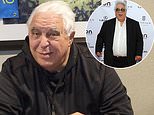Dyson invests in batteries that can DOUBLE your phone's power - and boost energy in electric cars and household gadgets
- Dyson inventor Sir James Dyson has invested $15 million in Sakti3
- Firm's solid-state battery stores more power than standard lithium-ion
- Solid-state batteries (SSBs) are typically smaller than Li-ion batteries
- SSBs replace liquid electrolyte in current Li-ion with a metal coating
- This makes them more robust, safer and can double the energy density
- Batteries will feature in Dyson's range of cordless vacuum cleaners
- Technology could also be used in smartphones to double battery life
He revolutionised how we clean our homes but now Sir James Dyson is hoping to boost the battery life of our smartphones, cars and - of course - our vacuum cleaners.
The 67-year-old inventor and entrepreneur has invested $15 million (£10 million) in Michigan-based battery experts Sakti3.
The company has developed a range of 'solid-state' batteries (SSBs) that store 50 per cent more energy than current models and will make our favourite gadgets smaller and safer.
Scroll down for video

Dyson inventor Sir James Dyson has invested $15 million (£10 million) in Michigan-based Sakti3. The firm has developed a solid-state battery capable of storing double the amount of power as traditional lithium-ion models. The batteries could feature in Dyson's cordless cleaners as well as phones and other gadgets
It is the first investment Sir James has made outside of his bagless vacuum business.
Batteries have three main components - the anode, cathode and electrolyte.
This electrolyte is typically a chemical that separates the anode and cathode and moves the flow of electrical charge between the two.
The majority of batteries found in phones, electric cars and Sir James' range of cordless vacuums use lithium-ion (Li-ion) battery technology.
Lithium-ion batteries use a liquid electrolyte and because lithium is a highly-reactive element it stores a large amount of energy.
But this liquid electrolyte is often flammable and has been blamed for batteries bursting into flames when overheated, for example.
Due to the safety implications of placing flammable liquids in electric cars, too, many of these auto-based batteries have added safety features making them expensive to run.

Lithium-ion batteries use a liquid electrolyte but this liquid electrolyte is flammable. Sakti3's SSBs are based on the same Li-ion technology but replace the liquid electrolyte with a coating of non-flammable metal. This makes them safer, smaller, (pictured) more robust and mean they can be used at higher temperatures
In particular the battery has to be cooled down and can never fully charge or discharge resulting in wasted capacity.
Sakti3's SSBs are based on the same Li-ion technology but replace the liquid electrolyte with a coating of non-flammable metal.
This not only makes them safer for both the consumer and the environment, they are more robust - liquid electrolytes can be easily damaged - and can be used at higher temperatures.
Li-ion are extremely sensitive to high temperatures and it can cause them to degrade faster, for instance.
Sakti3 has already designed an SSB with an energy density rating - the amount of energy stored it can store - of 1,100 watt hours per litre.
This is said to be 50 per cent higher than than current lithium-ion batteries.
The firm has also demonstrated its prototype can survive more charge-discharge cycles than traditional Li-ion batteries which typically last two or three years - whether they are used or not.
Other companies including Toyota are also working on developing similar technology.
Sir James' investment in Sakti3 is part of a larger $20miillion (£13 million) round of investment that will see the technology sold commercially and added to Dyson products.
This would include the firm's latest cordless V6 Fluffy designed to work with wooden floorboards, ceramic tiles and vinyl or laminate flooring.
Sir James said: 'Sakti3 has achieved leaps in performance which current battery technology simply can't. It's these fundamental technologies - batteries, motors - that allow machines to work properly.
'The Sakti3 team has amazing ambitions, and their platform offers the potential for exponential performance gains that will supercharge the Dyson machines we know today.'

The firm has also demonstrated its prototype can survive more charge-discharge cycles than traditional Li-ion batteries which typically last two or three years. Sir James' investment in Sakti3 is part of a larger $20miillion (£13 million) round that will see the technology sold commercially and added to Dyson products

This would include the firm's latest cordless V6 Fluffy designed to work with wooden floorboards, ceramic tiles and vinyl or laminate flooring (pictured)
Most watched News videos
- Scottish woman has temper tantrum at Nashville airport
- Tesla Cybertruck explodes in front of Trump hotel in Las Vegas
- Mass panic as New Orleans attacker flies down Bourbon street
- Shocking moment zookeeper is fatally mauled by lions in private zoo
- Horrific video shows aftermath of New Orleans truck 'attack'
- Meghan Markle celebrates new year in first Instagram video
- Tesla Cybertruck burns outside Trump hotel in Las Vegas
- See how truck that drove into crowd made it through police barrier
- Cheerful Melania Trump bops to YMCA at Mar-a-Lago NYE bash
- New Orleans terror attack suspect reveals background in video
- Plane passenger throws drink at flight attendant in boozy fight
- Horrifying moment yacht crashes into rocks and sinks off Mexico coast

































































































































































































































































